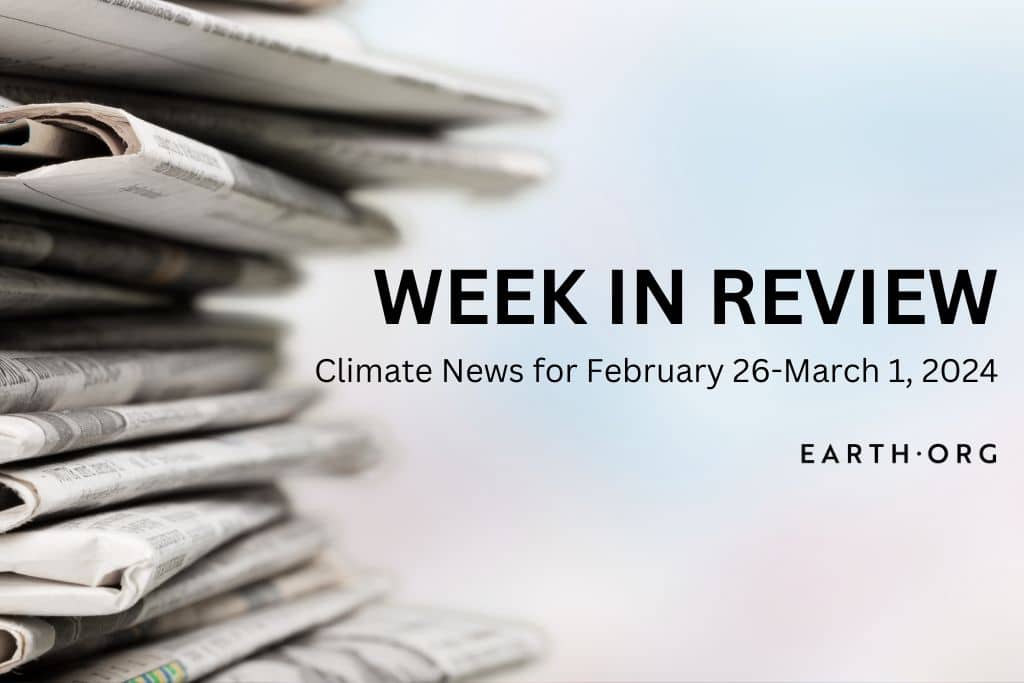This weekly round-up brings you key climate news from the past seven days, including new EU legislation on environmental crimes and New York Attorney General’s lawsuit against the world’s top meatpacker, JBS.
—
1. NY Sues World’s Top Meat Producer JBS Over Misleading Sustainability Claims
According to the plaintiff, New York Attorney General Letitia James, JBS USA “repeatedly” misled consumers into thinking the company “was taking substantial and definitive action to reduce their greenhouse gas emissions and mitigate the impacts of their industrial agricultural practices on the environment,” and had “no viable plan” to meet its “net zero by 2040” commitment.
“When companies falsely advertise their commitment to sustainability, they are misleading consumers and endangering our planet. JBS USA’s greenwashing exploits the pocketbooks of everyday Americans and the promise of a healthy planet for future generations. My office will always ensure that companies do not abuse the environment and the trust of hardworking consumers for profit,” the Attorney General said in a statement.
According to the court filing, the world’s top-five meat and dairy corporations combined generate more greenhouse gas emissions than fossil fuel giants ExxonMobil, Shell, or BP individually, with the JBS Group being the largest contributor. In 2021, the company reported over 71 million tons of greenhouse gas emissions, the equivalent of nearly 16 million gasoline-powered cars driven for one year.
Read more here.
2. Polar Bears at Risk of Starvation as Arctic Ice Sheets Melt, Scientists Warn
Published earlier this month in the scientific journal Nature Communications, the study used video camera GPS collars to track polar bears movements for three-week periods over the course of three years in Canada’s Hudson Bay, an inland marginal sea of the Arctic Ocean. Here, ice-free periods have lengthened by three weeks between 1979 and 2015, forcing bears onshore for approximately 130 days during the past decade.
The Arctic is heating up twice as fast as anywhere else on the planet, shrinking sea ice cover by 14% per decade. Compared to the median sea ice cover recorded between 1981-2010, the region has lost about 770,000 square miles between 2011 to 2021, an area larger than Alaska and California combined.
Read more here.
3. China Off Track to Meet Near-Term Carbon Intensity and Coal Reduction Targets, Analysis Suggests
Despite China’s updated climate pledges and government pressure to hit emissions reduction targets, CO2 emissions from the energy sector in the country rose 12% between 2020 and 2023, owing to a post-pandemic rebound in coal and oil demand, according to the new study by the Centre for Research on Energy and Clean Air (CREA) published last week in Carbon Brief. Oil and gas consumption also increased last year, owing to declining prices from 2022 highs.
While the fast deployment of clean energy has put the nation on track to double its wind and solar capacity by 2025 and reach its clean energy target five years ahead of schedule, last week’s analysis paints a different picture, arguing that the country is “severely” off track on most of its climate targets. In particular, the authors suggest that meeting its target to cut carbon intensity by 18% between 2021 and 2025 will require a 4-6% drop in CO2 emissions by the end of next year. Carbon intensity refers to CO2 emissions per unit of economic output.
Read more here.
4. Extreme Weather Events Cause $200bn in Economic Losses Globally, Philippines and US Hit the Hardest, Report Finds
According to Zurich-based reinsurance company Swiss Re’s latest report “Changing climates: the heat is (still) on”, the combination of four extreme weather events – floods, tropical cyclones (hurricanes and typhoons), winter storms in Europe, and severe thunderstorms – results in an estimated global economic loss of US$200 billion annually.
The analysis, which ranked 36 countries based on the vulnerability of their properties from the intensifying climate crisis, identified the Philippines and the US as the most economically exposed countries to the aforementioned weather hazards today, facing annual economic losses of US$12 billion and $97 billion – or 3% and 0.38% of their GDP equivalent, respectively.
Read more here.
5. New ‘Ambitious’ EU Legislation to Combat Environmental Crimes Introduces Tougher Penalties for Polluting Companies’ Representatives
European Union lawmakers on Tuesday adopted an extended list of environmental crimes and tougher, bloc-wide punishments for offenders under the “polluters pay” principle, addressing discrepancies between member states’ sanction regimes.
Environmental crime is the fourth-largest criminal activity in the world and it is on the rise, growing at a yearly rate of 5-7%. It refers to illegal activities that harm or exploit the environment, violating laws and regulations put in place to protect natural resources, ecosystems, and human health.
The updated list of offences contained in the new directive approved yesterday with 499 votes in favour, 100 against, and 23 abstentions includes illegal timber trade, depletion of water resources, serious breaches of EU chemicals legislation, pollution caused by ships, and serious breaches of rules on the introduction and spread of invasive alien species. The bloc-wide legislation also targets the illegal production, import, export, use, and release of fluorinated greenhouse gases, man-made gases used in industry and they have a high global warming potential, often several thousand times stronger than carbon dioxide (CO2).
Read more here.

















